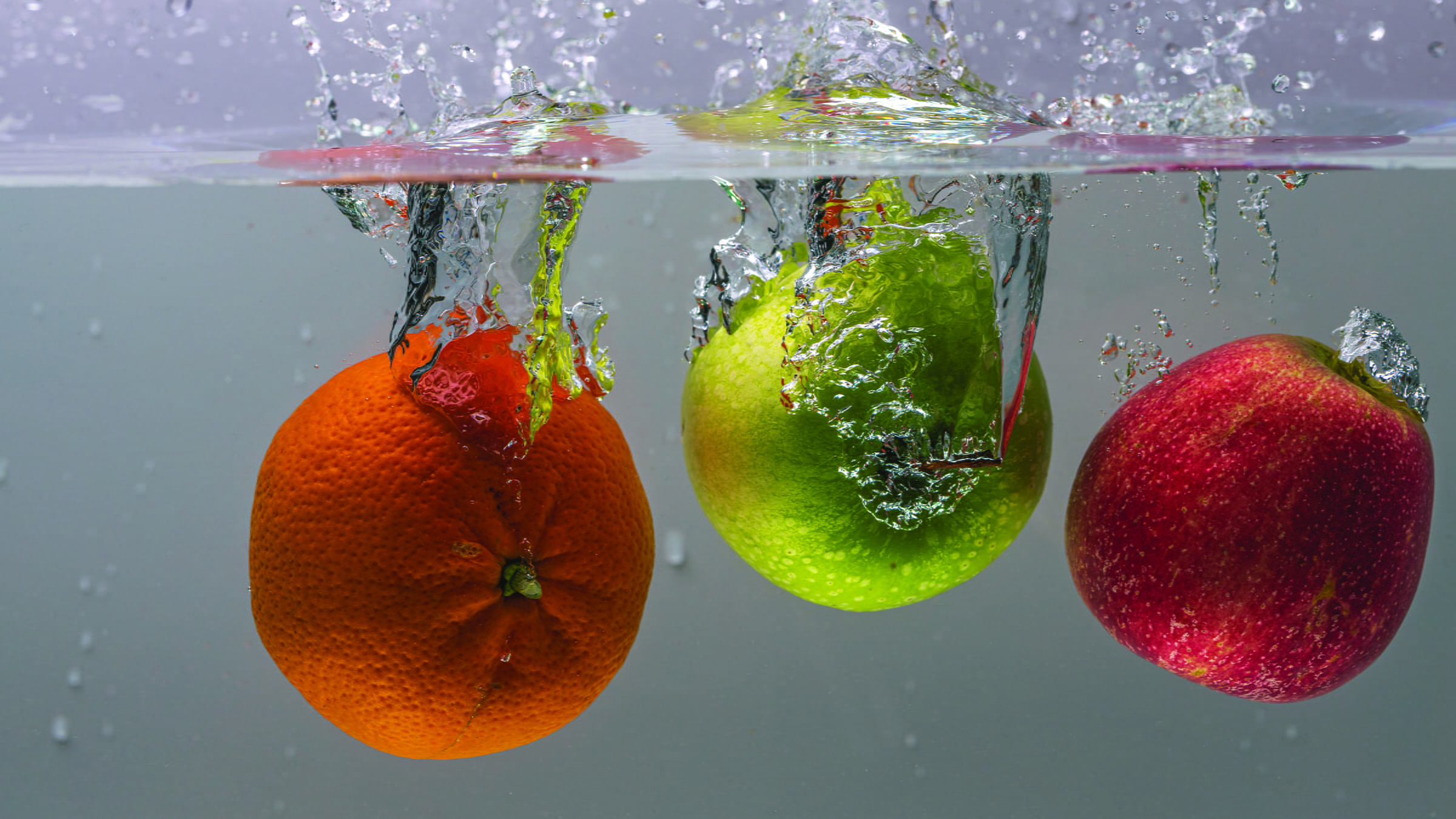
When we think about hydrating our bodies, the first thing that comes to mind is water. It’s important to ensure that you’re giving your body several glasses every day, especially when the temperature is high or you’re physically exerting yourself.
But there are other ways to feed your body’s hydration needs. In fact, foods generally contribute about 20% of the body’s total water intake, and it’s recommended that individuals meet their daily hydration needs from a variety of beverages and foods.
What drinks are best for meeting hydration needs?
In addition to water, milk and juice are good drink choices. From a nutritional standpoint, it’s best to choose low- or nonfat dairy milk or unsweetened varieties of plant-based milk to help minimize calories, saturated fat and added sugars. Similarly with juice, it’s best to stick to varieties made with 100% juice and keep portions to 4 fluid ounces to help minimize calories and added sugar.
Other beverages that contribute to hydration include teas, coconut water, , broths and smoothies.
Do fruits and vegetables provide hydration?
Yes. Raw fruits and vegetables contribute to fluid needs because of their high water content.
Fruits and vegetables can assist in supporting hydration and may also be slightly, but not significantly, more hydrating than water in the short term. This is likely due to the electrolytes typically found in produce that further benefit body fluid balance. However, daily hydration status is generally well maintained so long as fluid and food are readily available and regularly balanced into the diet.
Fruits and vegetables with more than 80% water content are a great choice to regularly incorporate into the diet.
Some items and their percentage water content, according to the U.S. Department of Agriculture's FoodData Central:
- Cucumbers: 96%
- Celery: 95%
- Radishes: 95%
- Lettuce: 94-96%
- Tomatoes: 94%
- Zucchini and summer squash: 94%
- Asparagus: 92%
- Bell peppers: 92-94%
- Cauliflower: 92%
- Grapefruit: 92%
- Mushrooms: 92%
- Spinach: 92%
- Watermelon: 92%
- Cabbage: 91-92%
- Strawberries: 91%
- Cantaloupe: 90%
- Honeydew: 90%
- Kale: 90%
- Broccoli: 90%
- Carrots: 89%
- Peaches: 88%
- Oranges: 87%
- Raspberries: 86%
- Pineapple: 85%
- Kiwi: 84%
- Apples: 83-85%
What other foods contribute to hydration?
People may also get water from soups, stews, gazpacho and tzatziki sauce.
What are some other health benefits of meeting hydration needs with foods?
Fruits and vegetables have held a place in dietary guidance because of their concentrations of vitamins, especially vitamins C and A that, for example, benefit the body’s immune system and the maintenance of healthy vision; minerals, especially electrolytes potassium, sodium, calcium, and magnesium that benefit body fluid balance; and phytochemicals that act as antioxidants and anti-inflammatory agents to protect against disease.
Does coffee contribute to dehydration?
Although coffee has been shown to increase urine output, confirming its diuretic activity, this effect is minor. When used in moderation, coffee doesn’t cause dehydration. Consuming about 400 mg (four to five 8-ounce cups) per day is considered safe by the U.S. Food and Drug Administration.
Does alcohol contribute to dehydration?
Alcohol inhibits the body’s release of the hormone vasopressin (also called the anti-diuretic hormone) — responsible for maintaining kidney health, blood pressure and fluid and electrolyte balance — making blood more concentrated than normal. Alcohol’s diuretic effects are influenced by various factors, including alcohol strength, amount consumed, frequency of consumption and hydration levels before drinking. The 2020-2025 Dietary Guidelines for Americans encourages adults to “choose not to drink, or to drink in moderation by limiting intake to 2 drinks or less in a day for men and 1 drink or less in a day for women.”
The guidelines also “do not recommend that individuals who do not drink alcohol start drinking for any reason.”
Are other drinks or foods associated with dehydration?
The use of cold carbonated drinks and sugar-sweetened beverages, such as regular sodas and energy drinks, can increase risk or worsen symptoms of dehydration and should be avoided.
Consuming foods high in salt also tends to stimulate kidney activity, causing dehydration. Examples are bouillon cubes, cured meats, fried foods, frozen meals, ultra- or highly processed foods, salted popcorn, salted pretzels and soy sauce.
What’s the recommended daily water intake?
Adequate hydration is critical for bodily functions, including metabolism, fluid and electrolyte balance, nutrient transport, waste removal, aiding digestion, preventing constipation, cushioning joints, protecting organs and tissues, temperature regulation and normalizing blood pressure.
Ideal water intake requirements necessary to maintain these functions vary between individuals and are difficult to standardize due to differences in age, sex, body size, diet, physical activity and the climate and altitude where one lives. Similarly, daily water intake recommendations vary based on pregnancy and breastfeeding.
Other factors that influence daily water requirements include:
- Excess water loss from the skin: sweat, burns, severe skin diseases
- Excess water loss from the kidneys: kidney disease, Addison’s disease, high blood sugar levels, use of diuretics
- Excess water loss from the digestive tract: diarrhea, loose stools, vomiting, laxatives
- Excess water loss due to hyperthyroidism, chronic obstructive pulmonary disease (COPD), sepsis
- Other disease processes: congestive heart failure (CHF)
- Medications that have water retention as a side effect: non-steroidal anti-inflammatory drugs (NSAIDs), opiate pain medications and some antidepressants
For generally healthy people, a recommended daily water intake is eight 8-ounce glasses per day; however, the U.S. Centers for Disease Control and Prevention maintains that there are no established recommendations.
Other organizations, such as the U.S. National Academy of Medicine, suggest total daily water intake of 15.5 cups for adult men and 11.5 cups for adult women for optimal hydration. These recommendations cover water, other beverages and food.

Healthy eating is within your reach!
Make an appointment with our dietitians or nutritionists.
Schedule an appointment



